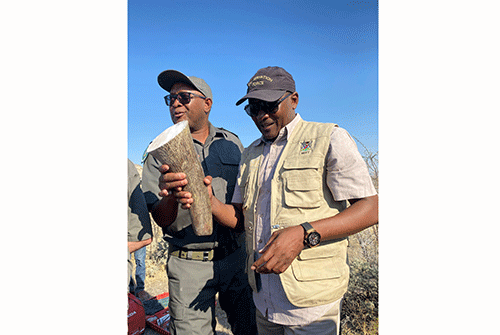In the span of seven years, the environment ministry has dehorned approximately 2 500 rhinos across the country, incurring a cost of N$50 million.
This initiative has been undertaken by the ministry as a measure to combat poaching.
According to the Save the Rhino website, Namibia was the first country to use dehorning to protect rhinos from poaching.
Speaking during the dehorning exercise in Etosha National Park last week, line minister Pohamba Shifeta said the exercise is costly but necessary to preserve the precious commodity.
Speaking to New Era, Shifeta said it costs about N$18 000 to N$20 000 to dehorn one rhino.
He said dehorning is incredibly costly, due to the effort of finding the animals and the costs associated with the immobilisation process, especially if needed on a recurrent basis.
This process takes about 20 minutes to complete.
He said irrespective of the cost, it’s very important to do it to protect the rhinos.
“Without the horns, they’re of no value anymore to poachers,” said Shifeta.
He remarked that the supposed value of the rhino horn is nothing more than an illusion and should not hold any significant worth.
Despite this, some individuals continue to utilise it in the production of medicine, despite the lack of scientific evidence supporting its efficacy in curing any diseases.
“The rhino horn is essentially comparable to a human nail,” he explained.
Dehorning is also done to avoid fatalities, as rhinos are territorial and hence engage in fighting more often which leads to death.
The front horns are cut up to eight centimetres and the back one at eight centimetres, a safe length that avoids harming or injuring the endangered species.
It takes three to five years for the horns to fully regrow.
Once the rhinos are dehorned, the horns are kept in the ministry’s bunker until such a time they see a need to sell them.
Shifeta said it costs about N$4 million to sell one rhino horn.
“We cannot destroy the ivory or horns as they hold significant value, and our policies dictate that we should derive benefits from natural resources while also preserving them,” he emphasized.
He further expressed hope that one day they would be able to sell these items and generate income.
The funds generated would then be utilised to invest in the protection and conservation of these endangered animals.
Shifeta noted that with such a substantial amount of money, they would be able to dehorn approximately 4 000 rhinos annually, providing them with better protection and ultimately eradicating poaching.
Anti-poaching
Speaking on the anti-poaching efforts in the country, Shifeta acknowledged that poaching in national parks is currently under control as poachers have redirected their attention to private game reserves.
“When they see there are no loopholes to manipulate, they shift their focus to the private sector,” he added.
However, he highlighted that the government is actively engaging in partnerships with the private sector to collectively combat poaching.
In the previous year, approximately 80 rhino carcasses were observed in national parks across the country.
He said the actual number might be higher due to poachers concealing the carcasses amidst bushes, making them challenging to detect during inspections.
Shifeta further disclosed that a considerable portion of poaching incidents can be attributed to internal involvement, with the involvement of officials from the ministry and law enforcement agencies being implicated.
“These are people who were supposed to protect the animals. In recent years we have arrested over 30 officials, including soldiers and employees of the ministry,” he said.


